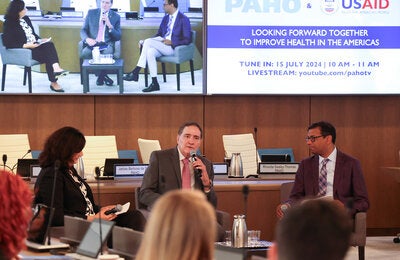
 Chronic diseases such as heart disease, stroke and cancer are the leading causes of death for both women and men throughout the world, but addressing differences in how these diseases affect men and women is essential to successfully fight them, say experts on gender and public health.
Chronic diseases such as heart disease, stroke and cancer are the leading causes of death for both women and men throughout the world, but addressing differences in how these diseases affect men and women is essential to successfully fight them, say experts on gender and public health.
PAHO/WHO and U.N. Women call for attention to gender at the upcoming U.N. summit on noncommunicable diseases
Washington, D.C., 28 February 2011 — Chronic diseases such as heart disease, stroke and cancer are the leading causes of death for both women and men throughout the world, but addressing differences in how these diseases affect men and women is essential to successfully fight them, say experts on gender and public health.
 "Unlike the infectious diseases and reproductive complications that killed our ancestors, chronic noncommunicable diseases are predominantly behavior or lifestyle diseases," said Dr. Marijke Velzeboer, senior advisor on gender, diversity and human rights at the Pan American Health Organization/World Health Organization (PAHO/WHO). "These diseases and their risk factors are very much influenced by roles and expectations in society."
"Unlike the infectious diseases and reproductive complications that killed our ancestors, chronic noncommunicable diseases are predominantly behavior or lifestyle diseases," said Dr. Marijke Velzeboer, senior advisor on gender, diversity and human rights at the Pan American Health Organization/World Health Organization (PAHO/WHO). "These diseases and their risk factors are very much influenced by roles and expectations in society."
Velzeboer's remarks were part of a panel discussion on "Chronic, Noncommunicable Diseases: a Women's Health Priority," held last Friday in New York City to highlight the need to incorporate a gender perspective into the upcoming United Nations High Level Meeting on Non-Communicable Diseases, scheduled as part of the U.N. General Assembly next September.
Velzeboer and other panelists noted that gender roles create different expectations and behaviors in men and women that affect chronic disease incidence and outcomes, including tobacco use, exercise and treatment-seeking. Other important differences include:
 Women tend to be affected by chronic diseases at younger ages than men.
 Women live longer than men but do so with greater disability and less social protection (for example, as pensioners) than men.
 As daughters, sisters and informal workers, women are the main—and often unpaid—long-term health-care providers for chronic disease sufferers.
U.N. Women's regional director for Latin America and the Caribbean, Gladys Acosta, noted that the right to health is clearly mandated in such human rights instruments as the Convention to End all Discrimination against Women.
Dr. Aurora Del Rio of the Mexican National Center for Gender Equity and Health studied the diabetes in Mexican women and men and found that gender roles were a strong determinant of chronic disease risk. Based on this research, Mexico's Secretariat of Health launched a national health promotion campaign that was honored by PAHO as a "Best Practice of Mainstreaming Gender in Health" in 2008.
Prof. Trevor Hassell, of the Barbados National Commission for Chronic Non-Communicable Diseases, pointed out that obesity rates in Caribbean countries are as much as four times higher among women than in men. In Barbados, for example, 7 percent of 9-year-old boys and 13 percent of girls are obese. Among adults, disability and mortality from diabetes have increased more for women than for men.
Until recently, women were underrepresented as both researchers and subjects of chronic disease research, said Dr. Vivian Pinn, director of the Office of Research on Women's Health at the U.S. National Institutes of Health. "Since we were children, we knew that boys and girls are different," she said, "but it took advocacy that resulted in legislation that mandated an equal number of women and men to be included in all NIH-funded studies." She called for innovative strategies to increase the number of women health researchers, including reentry programs for mothers.
Members of Friday's panel recommended that the U.N. High Level Meeting on Non-Communicable Disease focus special attention on gender factors related to chronic disease risks, treatment and care. In addition, Prof. Hassell called on women and gender advocates to support the establishment of a civil society task force under the Office of the President of the U.N. General Assembly and urged the inclusion of women's and gender organizations in the official national delegations to the upcoming chronic disease summit.
The panel was organized by PAHO/WHO, U.N. Women, and the U.N. missions of Mexico and Barbados. The audience included delegates from permanent U.N. missions, visiting government officials, and representatives of nongovernmental organizations who were gathered for the 55th Session of the U.N. Commission on the Status of Women.
For more information contact Oswaldo Gomez, Pan-American Health Organization, gomezo@paho.org.



